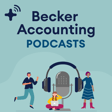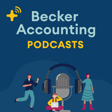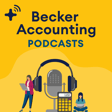
Cool Careers in Accounting Ep. 18 - At the Intersection of Expertise and Creativity with Kelly Richmond Pope
Kelly Pope is an inspiration in the accounting profession. A trailblazer in the field of accounting and beyond, she is a CPA, PhD, and professor as DePaul University. Her career path is anything but traditional, taking her from documentary filmmaking to TED Talks to innovative educational platforms. In this conversation with host Mike Potenza, she discusses her passion for accounting, emphasizing its relevance and power in understanding financial dynamics. And she inspires young accounting professionals to hone their capabilities and leverage their creativity as they grow unique careers.
Earn CPE by listening to this podcast through a Becker Prime CPE subscription.
Listen to this episode through your Becker LMS platform to complete practice questions, pass the final exam, and earn CPE credit.
Already a Becker Prime CPE customer? Login here.
Have access to Becker CPE through your employer? Earn CPE credit for this podcast however you consume Becker CPE, either through your company’s LMS or via the Becker platform. Not sure where to log in? Check with your CPE admin.
Learn more about CPE Podcasts from Becker: https://www.becker.com/cpe/becker-podcasts


